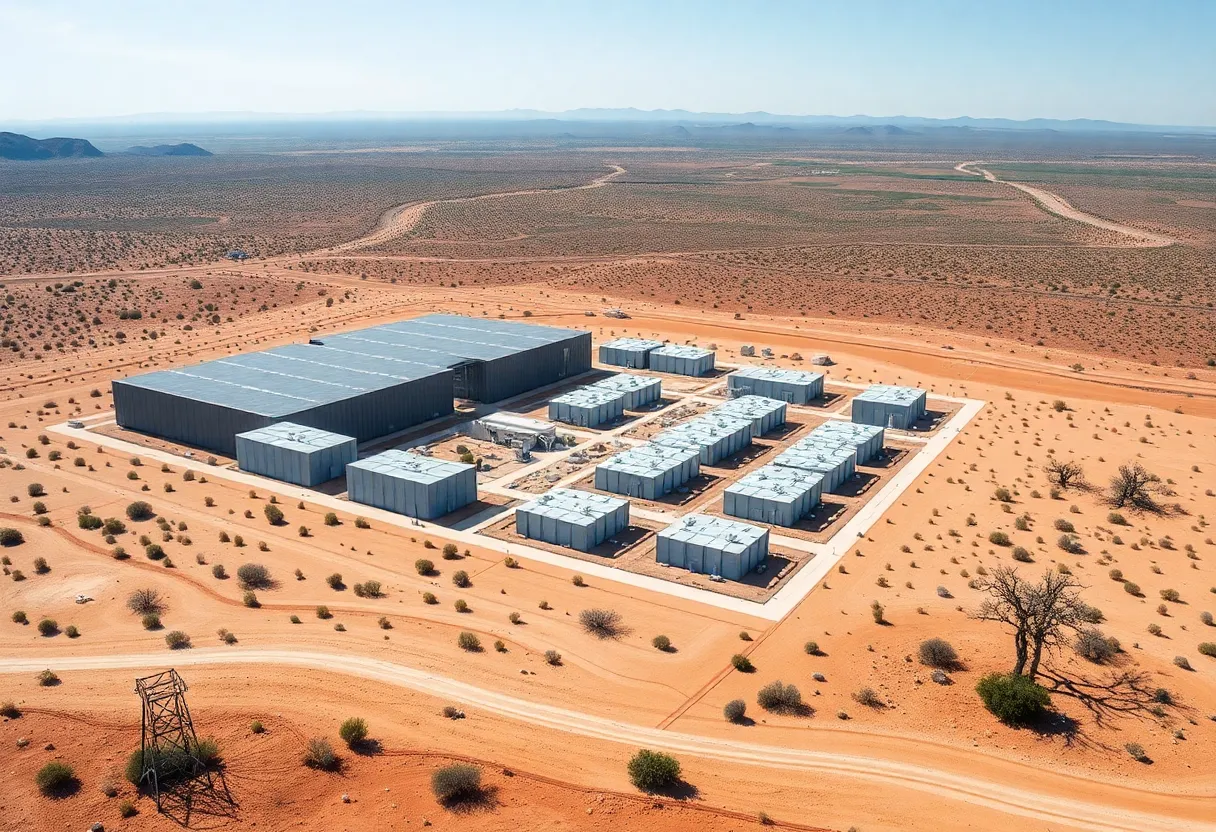California, September 28, 2025
News Summary
California lawmakers face challenges in implementing stricter regulations on data centers, with only two out of four proposed bills remaining. The remaining bills have been significantly weakened, prompting concerns over water usage and energy consumption amid rising demands due to artificial intelligence. Critics argue that the legislative dilution favors data center operators, hindering transparency and environmental protections as the state navigates issues of drought and energy demands. Local communities emphasize the need for more accountability in data center expansions.
California lawmakers have been unable to implement stricter regulations on data centers despite indicating a desire for action at the beginning of the year. After nine months of legislative efforts, only two out of four proposed data center bills remain, and these have been notably weakened.
The two bills now awaiting Governor Gavin Newsom’s approval are significantly less comprehensive than initially proposed. Senate Bill 57, for instance, mandates water use disclosure by data center operators but allows for less public access to this information. Assembly Bill 93 requires data centers to notify water suppliers of their estimated water consumption when applying for or renewing business licenses and encourages the creation of water use efficiency guidelines.
In contrast, two other proposed bills did not advance in the Legislature. One aimed to require data centers to disclose their energy consumption, while the other sought to provide incentives for data centers to adopt cleaner energy practices. The lack of progress on these bills highlights ongoing concerns regarding data centers, which are increasingly viewed as a pressing public policy issue due to their significant role in storing and transmitting vast amounts of digital content, including that from major platforms like TikTok and Amazon.
The rapid rise of artificial intelligence (AI), particularly systems like ChatGPT, has resulted in a sharp increase in the number of data centers. This surge in facilities has led to heightened demands for water—essential for cooling vital components like semiconductors. As a consequence, there are growing worries about stress on local water reservoirs and the potential rise in electricity costs for residential customers.
California is home to one of the world’s largest concentrations of data centers, fueled by a reported 40% increase in hookup requests to Pacific Gas and Electric (PG&E). In July, the California Public Utilities Commission streamlined the project application process for data centers, facilitating their expansion.
However, amendments to Senate Bill 57 have diluted its focus on safeguarding energy consumers from the infrastructure costs tied to data centers. The mandate was reduced to merely assessing the potential for cost shifts to other customers, rather than ensuring protections against such shifts. The Utility Reform Network, which initially supported Senate Bill 57, later described it as ineffective due to lobbying influences that caused significant changes.
PG&E’s initial opposition to Senate Bill 57 was withdrawn following recent changes to the proposal. With California under duress from persistent drought conditions, concerns over data center water use have intensified. A Stanford study pointed to the state as a popular location for future data center projects, especially in areas experiencing high water stress.
Environmental advocates have expressed worry that the lack of transparency in data center water usage stymies community understanding of local impacts and objections. The dilution of legislative proposals is viewed by critics as favoring data center operators, compromising public access to crucial water usage data.
Moreover, California’s power grid is facing challenges due to the increasing energy demands from data centers. Projections suggest that by 2030, these facilities could require enough power for millions of homes. Local governments and communities are becoming more involved in discussions about the environmental implications of these expansions, stressing the need for transparency and fairness in planning.
Data center expansions have also sparked disputes over air quality, water consumption, and electricity loads, potentially posing public health risks. There are ongoing concerns regarding the use of diesel generators in data centers, contributing significantly to greenhouse gas emissions. This situation has created a polarized discussion between tech advocates and environmentalists about the balance between expanding infrastructure and adhering to state climate goals.
Experts indicate that innovative solutions will be essential for the data center industry to navigate the growing demands for energy and resources in California’s rapidly changing climate.
Frequently Asked Questions (FAQ)
What is the current status of data center regulation in California?
California lawmakers began the year indicating a desire to impose stricter regulations on data centers to protect the environment and electricity ratepayers. After nine months, only two out of four proposed data center bills are currently on Governor Gavin Newsom’s desk, and those have been significantly weakened.
What does Senate Bill 57 mandate?
Senate Bill 57 mandates water use disclosure by data center operators but allows the information to be less accessible to the public.
What are the concerns regarding data centers in California?
Data centers are increasingly seen as a public policy concern due to their role in storing and transmitting content on the internet, linked to platforms like TikTok and Amazon. The demand for artificial intelligence (AI), particularly systems like ChatGPT, has led to a surge in the proliferation of data centers.
Key Features of the Data Center Regulation Situation in California
| Feature | Status |
|---|---|
| Total Proposed Bills | 4 |
| Passed Bills | 2 |
| Failed Bills | 2 |
| Water Use Disclosure Mandate | Yes (limited public access) |
| Electricity Impact Assessment | Reduced Scope |
| Environmental Concerns | Rising, especially with drought conditions |
| Future Power Demand Projection by 2030 | Equivalent to millions of homes |
Deeper Dive: News & Info About This Topic
- Los Angeles Times: California legislature passes two watered-down bills to regulate data center water use
- Wikipedia: Data Center
- LAist: AI supercomputers need lots of electricity
- Google Search: California data centers climate
- Daily Journal: California’s data centers face a climate cooling dilemma
- Encyclopedia Britannica: Data Center
- Capital & Main: As California AI data centers grow, so does dirty energy
- Google News: California data centers regulation

Author: STAFF HERE BEVERLY HILLS WRITER
The Beverly Hills Staff Writer represents the experienced team at HEREBeverlyHills.com, your go-to source for actionable local news and information in Beverly Hills, Los Angeles County, and beyond. Specializing in "news you can use," we cover essential topics like product reviews for personal and business needs, local business directories, politics, real estate trends, neighborhood insights, and state news affecting the area—with deep expertise drawn from years of dedicated reporting and strong community input, including local press releases and business updates. We deliver top reporting on high-value events such as the Rodeo Drive Concours d'Elegance, the Beverly Hills artSHOW, Concerts on Canon, and holiday celebrations throughout the city. Our coverage extends to key organizations like the Beverly Hills Chamber of Commerce and Visit Beverly Hills, plus leading businesses in luxury fashion, hospitality, and entertainment that drive the local economy. As part of the broader HERE network, including HERELosAngeles.com, HERESantaAna.com, HEREHuntingtonBeach.com, and HERECostaMesa.com, we provide comprehensive, credible insights into Southern California's dynamic landscape.




